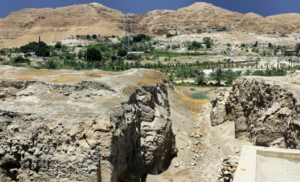I love a good dose of irony. Just yesterday in the sermon we noted how Pharaoh ordered all the Hebrew boys to be tossed into the Nile (Exodus 1) and in a delightful bit of “malicious compliance,” Moses’ mother does just that…by putting her son in the shelter of a little ark before releasing him into the Nile.
Speaking of Moses, another great moment of irony comes in the New Testament, when Paul talks about the “baptism of Moses” (1 Corinthians 12). Notice the text…
Moreover, brethren, I would not that ye should be ignorant, how that all our fathers were under the cloud, and all passed through the sea;
And were all baptized unto Moses in the cloud and in the sea;(1 Corinthians 10:1-2)
That word “unto” in the King James is, in the Greek, “eis,” a word that means “into” or “unto” or “for.” In other words Paul, who preached regularly about the need for people to be baptized “unto,” “into,” or “for” Jesus Christ (Romans 6:3), now takes our minds back to the Old Testament, and to a time when the Hebrews were baptized “unto,” “into,” or “for” Moses. Now if you know anything about baptism as the word is used in the New Testament, you know it typically involves water (Acts 8:36), or even “much water” (John 3:23), and that’s what makes the “baptism of Moses” such a great play on words on the part of Paul.
The baptism in question occurred during the Red Sea crossing, an event famous for how dry everyone was when it was over. So why is it that Paul chose to describe the time when his ancestors passed on dry ground as a “baptism,” especially knowing how many times in the past he used the word “baptism” to mean “immersion into water”? Keep in mind that the word “baptism” doesn’t mean “immersed into water.” That’s just the common way Paul (and other New Testament preachers) used it. The word in the Bible simply means “an overwhelming” or “a total covering.” And the Red Sea crossing certainly qualifies…
When the Hebrews crossing the River looked DOWN, what did they see?
They saw the dry ground, which God prepared for them, safe for them. They walked on it as though there had never been a Sea.
When the Hebrews looked LEFT AND RIGHT, what did they see?
They saw walls of water, which God held in place, yielding to them. They journeyed with the confidence that they would not drown.
When the Hebrews looked BACK, what did they see?
They saw a pillar of fire, which God created, protecting them. They went with a song on their lips, knowing that God had bested the Pharaoh.
When the Hebrew looked UP, what did they see?
They saw a cloud, which God provided, leading them. They never would worry about which way to turn, because they followed the lead of their Lord.
When the Hebrew looked FORWARD, what did they see?
They saw the land, which God promised, ahead of them. It may not look like much in that picture, but it’s home.
In other words, everywhere they turned they found themselves face to face with a blessing provided by God. They were completely surrounded by what God had done for them. They were overwhelmed by protection of the Lord. And since it was Moses who led them, rightly does Paul say the people were “baptized” unto Moses. And, of course, there’s the great irony of it all…
The baptism of Moses is the one baptism where everyone was saved and no one got wet!
~ Matthew






